When it comes to various beliefs about biblical texts and religious figures and teachings, the survey does not reveal one clear pattern among Hispanics. On some questions – such as whether the Bible is the word of God and should be taken literally and whether Jesus will return to Earth in one’s lifetime – Hispanic evangelical Protestants exhibit higher levels of belief than do other religious groups. But on other questions – such as whether social problems can be solved by more people being “brought to Christ” and whether God grants health and wealth to believers with deep faith – members of different religious groups hold similar views.
On many questions, Hispanics differ by nativity or other demographic characteristics. For example, Hispanic immigrants are more likely than U.S.-born Hispanics to believe that the Bible is the word of God and that Jesus will return in their lifetime. And lower-income Hispanics are more likely than those with higher incomes to say that God will grant wealth and good health to believers with enough faith.
Trends reported in this chapter come from the 2006 Pew Research Center survey of Hispanics and religion and a subsequent call-back survey of Hispanic Catholics conducted in 2007. See Appendix A: Survey Methodology for more detail.
For additional analysis of the beliefs of renewalist Hispanics on several of these questions, see Chapter 7.
Biblical Literalism
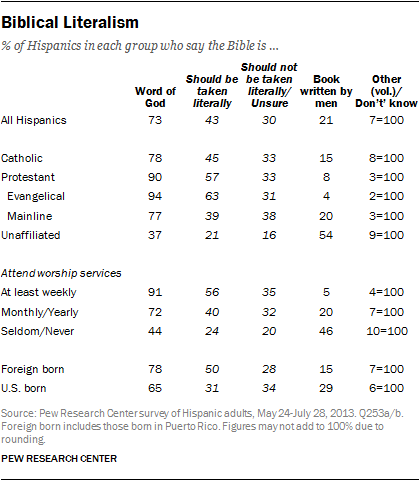
The Pew Research survey finds that roughly three-quarters of Hispanics (73%) believe that the Bible is the word of God, including 43% who say it should be taken literally, word for word. One-in-five Hispanics (21%) say it is a book written by men, and 7% give another response or decline to answer.
A large majority of Hispanic evangelical Protestants (94%) say that the Bible is the word of God. Smaller shares – though still clear majorities – of mainline Protestants (77%) and Catholics (78%) say the same. Compared with other religious groups, Hispanic evangelical Protestants also are especially likely to say that the Bible should be taken literally (63%).
Somewhat more Latino Catholics say that the Bible should be taken literally (45%) than say it should not be (33%), while the balance of opinion is about evenly split among mainline Protestants (39% say it should be taken literally; 38% say it should not be). By contrast, about half of Latinos who are unaffiliated (54%) say the Bible is a book written by men and 37% say it is the word of God, including about a fifth (21%) who say it should be taken literally.
Latinos who attend religious services more frequently are more inclined to say the Bible is the word of God and that it should be taken literally. Two-thirds of evangelical Protestants who attend services at least weekly (67%) express this view, compared with half of evangelicals who attend services less frequently (50%). Similarly, about half of Catholics who attend Mass regularly (52%) say the Bible is the literal word of God, compared with four-in-ten who attend Mass less frequently (40%).
On average, Hispanic immigrants are more inclined than U.S.-born Hispanics to say the Bible is the word of God. Differences by nativity are most pronounced among Hispanic Catholics and mainline Protestants. About half of foreign-born Catholics (52%) say the Bible is the word of God and should be interpreted literally, compared with 32% of native-born Catholics. Similarly, nearly six-in-ten foreign-born mainline Protestants (58%) take the view that the Bible is the literal word of God, compared with 26% of U.S.-born mainline Protestants. And Hispanic immigrants who are religiously unaffiliated are more inclined than the native-born unaffiliated to say the Bible is the literal word of God (29% vs. 12%).
The Second Coming of Jesus
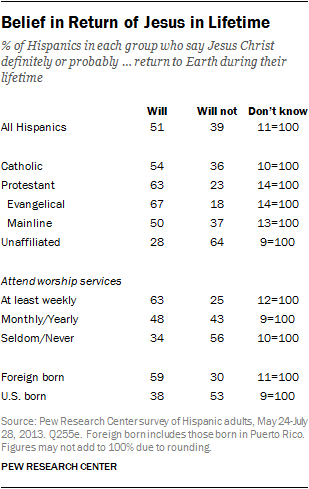
About half of Hispanics (51%) think that Jesus either definitely (24%) or probably (27%) will return during their lifetime. A somewhat smaller share (39%) say this probably (20%) or definitely (19%) will not occur.
Latino evangelical Protestants are more certain the second coming will occur during their lifetime; two-thirds (67%) hold this view, compared with roughly half of Catholics (54%) and mainline Protestants (50%). By contrast, a majority (64%) of religiously unaffiliated Latinos say Jesus definitely or probably will not return during their lifetime.
Foreign-born Hispanics are more likely than U.S.-born Hispanics to say Jesus will return during their lifetime (59% vs. 38%).
And those who attend worship services regularly are more likely than others to believe Jesus will return to Earth during their lifetime (63% of weekly attendees vs. 34% of those who seldom or never attend).
Beliefs About Mary and the Eucharist
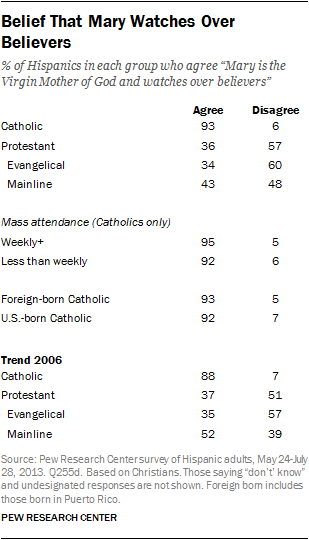
Views about the Virgin Mary differ widely between Catholics and Protestants. Belief that Mary is the Virgin Mother of God and that she watches over believers is nearly universal among Latino Catholics (93% agree). Far fewer Latino Protestants – about a third of evangelicals (34%) and four-in-ten mainline Protestants (43%) – agree that Mary watches over believers.
Among Catholics, vast majorities of both those who attend Mass weekly (95%) and those who attend less often (92%) agree that Mary is the Virgin Mother of God and watches over believers. And U.S.-born and foreign-born Catholics are about equally likely to agree with the statement.
Hispanic Catholics are slightly more likely to hold this belief now than in 2006, when 88% agreed that Mary is the Virgin Mother of God and watches over believers. Among other major religious groups, there has been no significant change in this belief since 2006.
On another core Catholic tenet, three-quarters of Hispanic Catholics (76%) believe that in Mass the bread and wine actually become the body and blood of Christ. One-in-five Hispanic Catholics (18%) do not believe this.
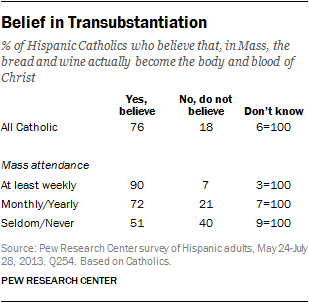
Belief in transubstantiation is strongly associated with frequency of church attendance. Fully nine-in-ten Catholics who attend Mass regularly hold this belief, as do 72% of those who attend services monthly or yearly. By contrast, only about half of Catholics who seldom or never attend Mass (51%) believe that the bread and wine actually become the body and blood of Christ.
There are no differences between foreign-born and U.S.-born Catholics on this issue.
A similar, though not identical, question in the 2007 call-back survey also found an overwhelming majority of Hispanic Catholics (87%) who said they believe the bread and wine used during Mass become the body and blood of Christ.
Christian Teachings About Prosperity, Social Problems
Hispanics are closely divided when it comes to belief in the so-called “prosperity gospel” – the idea that God will grant wealth and good health to believers who have enough faith. Roughly half of all Hispanics (49%) believe this, while 40% say that God does not always give wealth and good health even to believers who have deep faith.
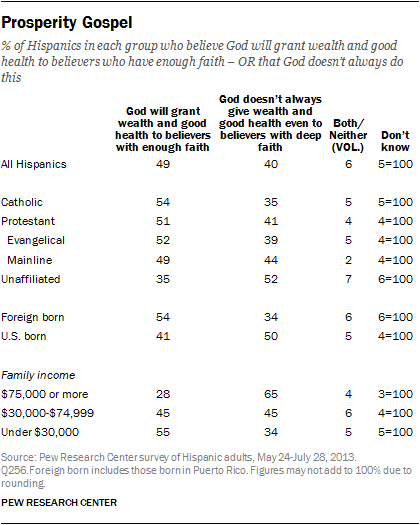
Differences among religious groups tend to be modest, especially when compared with other religious beliefs. About half of Latino Catholics (54%), evangelical Protestants (52%) and mainline Protestants (49%) believe in the prosperity gospel. A somewhat smaller share of the religiously unaffiliated (35%) also believe this.
Belief in the prosperity gospel is especially common among Pentecostal Protestants, among whom 65% say that God will grant wealth and good health to believers who have deep faith. (For more on Pentecostals’ and other renewalists’ beliefs, see Chapter 7.)
Belief in the prosperity gospel is associated with nativity; Latino immigrants are more likely than the U.S. born to hold this belief (54% vs. 41%). Those with lower family incomes (less than $30,000 per year) also are more inclined to say that God will grant wealth and good health to those with enough faith; more than half of lower-income Latinos (55%) say this, compared with 28% among those with annual family incomes of at least $75,000.
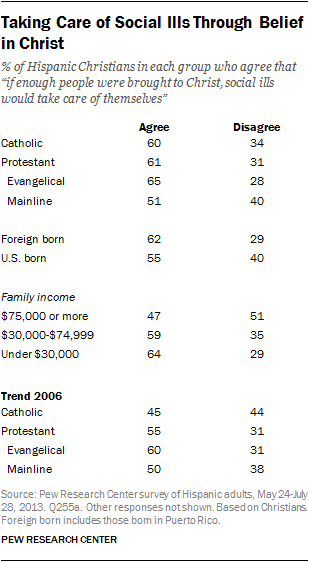
The Pew Research survey also asked respondents whether they agree or disagree with the following statement: “If enough people were brought to Christ, social ills would take care of themselves.” About two-thirds of Latino evangelical Protestants (65%) agree with this statement, as do six-in-ten Catholics (60%) and half of mainline Protestants (51%).
Compared with 2006, Hispanic Catholics are more likely to say that social ills can be addressed by people embracing Christ (45% in 2006 vs. 60% in 2013). Opinion among Hispanic evangelical and mainline Protestants is about the same as in 2006.
As with the prosperity gospel, beliefs on this topic are associated with nativity and family income. Hispanic immigrants are more likely than U.S.-born Hispanics to agree that social ills would take care of themselves if enough people were brought to Christ (62% vs. 55%). And those with a lower family income are more likely to agree with this statement than those with a higher income (64% among those earning less than $30,000, compared with 47% among those earning $75,000 or more).




